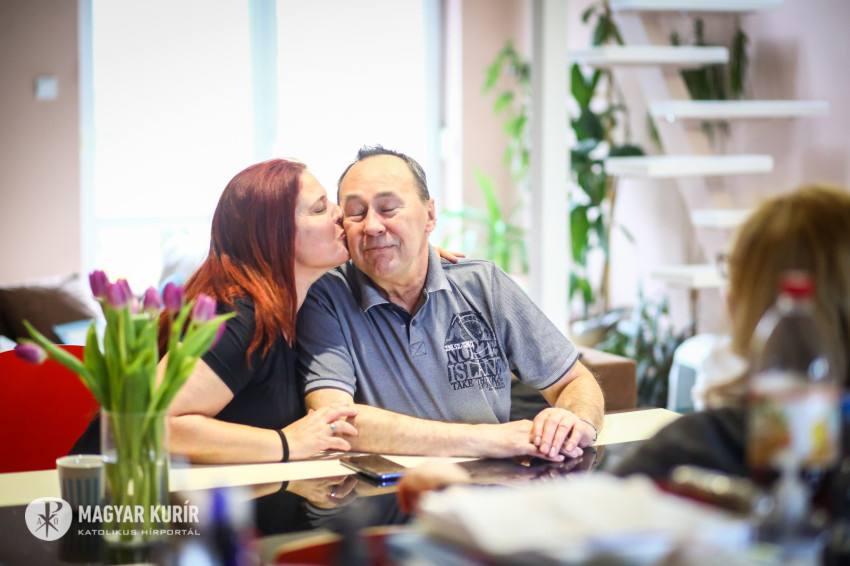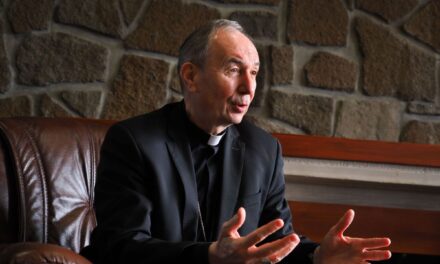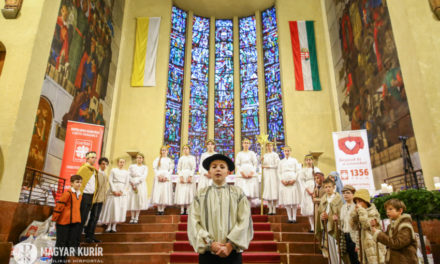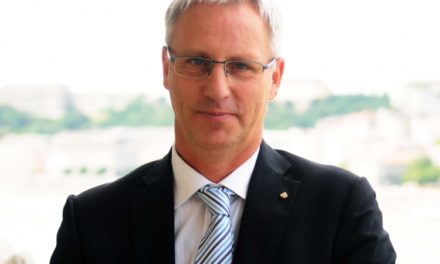A deep conversation about an ALS diagnosis, suffering, and ending life with dignity. Zsuzsanna Thullner's interview.
He has a long-standing acquaintance with missionary doctor Réka Fodor. This time, however, we were not talking about Nigeria and a medical mission, but about her very personal experience: the ALS disease and death of her husband, writer Sándor Greguss, and what human life means from a divine and human perspective, and what serious questions active euthanasia raises for patients and from the point of view of doctors.
They lived together for twenty-seven years, from their marriage they had two children, twenty-one-year-old Anna and sixteen-year-old Kinga. They were also partners in work, Afréka I–II about the mission in Nigeria. volumes were written by Sándor based on Réka's stories, and traveling the country together, they bore witness to faith, mission, marriage, and miraculous healing.
It was not the first time that Sándor came close to death: seven years ago, he suffered from a cancer that was deemed incurable, from which he was miraculously cured by the spiritual exercises of Sister Margaritha Valappila.
After that, he also felt it was his duty to accompany the dying on their journey, to help them reconcile with God and people. He was sixty-nine years old, full of energy and plans, when the progressive paralysis ALS (amyotrophic lateral sclerosis) attacked his body.
He had to wait months for a diagnosis of the rare disease, and four months later he died of pneumonia. But before that, he fulfilled one of his dreams: he traveled with his family to Andalusia. True, already in a wheelchair, but surrounded by the caring love of his wife and two daughters, enjoying the beauty and flavors of life until the last moment. I interviewed Grega - as his family and friends called him - . He spoke openly about the illness, the physical deterioration and how he wants to walk this journey with a smile on his friends' wives and daughters, who are attending the greatest school in life because of it.
ALS is an insidious disease, the picture of what the symptoms mean slowly came together. What was your history?
Seven years ago, Grega was already cured of cancer, so we did a blood test every three months, everything was fine. In February 2022, he finally had an operation on his knee, he received a prosthesis, he was very happy. We went on a tour of southern Italy, he took twenty to twenty-five thousand steps a day, he improved nicely. It fell in December, then again before Christmas. Then we called the ambulance, but according to the CT scan, he was fine. His nose was a little bruised in the Christmas photos. Neurosurgeon András Csókay came to dinner, and he suggested that we do a spine MRI, but it also only showed a hernia that did not need to be operated on. After that, he sent him for an electrophysiological examination, where they look at how far the stimulus travels from the brain to the peripherals. The result was bad, and by then Grega was already speaking more slowly, brushing her teeth with both hands.
In retrospect, I thank God that the diagnosis reached us late, because if the disease is fatal, it's better if you don't know sooner.
In the last couple of weeks, when we were waiting for the result, I already had an inkling of what it would be, and I was glad that I had to wait. Then I received the Gergely Alexandra Award, Father Izunna came from Nigeria... A week earlier, Grega also asked: do you think I have ALS? It might even be, I said, I wasn't lying to him, but my heart was torn. In Nigeria, the prayer chain was already organized; there so as not to cause an alarm at home, since he did not yet have the seal that he was going to die.
Getting a diagnosis of ALS was a tough test. How did you receive it?
Grega was always simple in serious matters. He kept asking if there was any treatment for it. The doctor said that there is none, only that it will be possible to prescribe the aids, a wheelchair, for example... These words really struck a chord, since at that time he only walked and spoke more slowly. That day he sat down in front of the computer and wrote out what was wrong with him, asked for prayers, told him that he would end up drowning.
It's hard to imagine a worse disease than this: you become paralyzed, unable to speak, locked in your own world, and in the end you suffocate, while your consciousness remains completely intact.
In April, he went to Sister Margaritha's retreat in Felsőmocsolád, where he had previously been healed, and where he has since taken many people to convert and heal. The sister said that Jesus will be glorified. They prayed for him in many charismatic groups, which was nice. Lots of people sent unsolicited information, but we asked for prayers, not panaceas.
Sándor, who was a writer, always taught throughout his life, and he did not give up this mission even in his illness. I was afraid to call him in the summer, but he was very happy to give me an interview.
He was transformed by his miraculous healing seven years ago, he had a very deep faith. He knew all along that he was not going to get better now, his condition was getting worse day by day. He sacrificed every day, actively wrote throughout, for four months. He was prepared not to lose his faith when he suffered for a long time, motionless. When he started to get worse, he must have wondered how his life would end. If there had been medical treatment, he would have accepted it, we also looked at drugs in the experimental stage.
He loved us very much, he loved life very much, but he gave it to God and went with him on the road.
I don't think he was ever afraid, but he didn't burden us with that. Immeasurable calmness and love emanated from him, also from his posts. He did not beautify, he accepted the deadly disease, he testified about his life and his dying: you must glorify God even when the circumstances on earth do not turn out according to your calculations. He never complained, but when he needed help, he always spoke. He wasn't looking for a miracle cure. In the last few days, Satan has been tempting him with the promise that he can heal him. But he said to him: "I am already redeemed." God was truly glorified by him. He must have answered the many prayers and recovered faster than most ALS patients. The great suffering in the hospital was concentrated in ten days, it is a mercy that he spared him the two or three years when he is closed in his world and cannot communicate his thoughts.
What is life like with an ALS diagnosis, how did the family live their lives afterwards?
Until the last days, we were waiting for a miracle, I always gave him a chance to heal. I already had my ticket to Ghana, thousands of people were waiting, and the resident doctors who were with me. I wanted to cancel the trip, but he said I should go now, when he can still take care of himself, and that it would be a sin if the death of two thousand people were to dry his soul. Our parish in Fót and our friends organized the koma bowl, someone cooked every day. Then came the medical mission in Nigeria, our daughter Anna and her friend Szabi also came, fifteen-year-old Kinga stayed with Grega, who gave herself completely. There was no need for a qualified nurse, you had to pick him up if he fell, talk to him, help him put on his shoes; amateur help and love were needed.
He did it with a patience I couldn't. Many people want to remove the child from the sick parent so that he does not see him in such a state, but Kinga's personality was definitely fulfilled by this, although I know that he did not escape the pain.
On our trip to Spain, Anna's job was to push the nun, she never once complained, she took out and adjusted the wheelchair ten times a day.
You took me on an amazing adventure when you went on a three-week tour of Andalusia, which Grega didn't want to give up. You didn't think it was impossible either?
There were three against one, everyone wanted to go except me. Thank God I didn't win the family vote. Twenty-two years ago, Grega and I had already been there, and we had always wanted to show it to our daughters. It won't be a vacation like usual, I told them. No problem, they answered. We bought a portable wheelchair, Anna had a new driver's license, and we drove nine thousand five hundred kilometers. Are you part of the problem or part of the solution? we asked ourselves and solved the problems. Grega swallowed and coughed every day, but he enjoyed the delicious tastes and smells, we drank wine. Everyone was looking at us in the restaurants, I had to go into all the men's toilets, apologizing everywhere, to lift them up. On the way home at Lake Garda, he coughed all night and had to call an ambulance. A private ambulance undertook to bring him home, and there a small miracle happened: he got better at night, there was enough oxygen for us to go all the way to Vác. We even socialized on the third day in the hospital.
He suffered in the hospital for ten days before he died. We followed him on social networks, many of us prayed for him.
He died on the tenth day of pneumonia. God took him to Himself. Of course, we can ask why he didn't heal him, but we know that life leads to heaven, and we owe him a great deal of gratitude. Humanly, it hurts, because our physical things are there, and after twenty-seven years of marriage, I miss him very much. But how do I come to account for the Good Lord? The first Christmas was very difficult without him, we were devastated. There are dead ends, I don't even understand how a non-believer doesn't go crazy.
It is easy to believe after experiencing a miraculous recovery, but not so much when someone dies so quickly.
"Don't envy Jesus," Csókay said when I felt sorry for myself.
Have you thought about how to shorten this suffering?
Even in the last ten days, we secretly hoped for a miraculous recovery. Kinga said she would rather take care of the nun for years than lose her. All I could say to that was that he will most likely die, but he lived such a beautiful life that he is going to heaven.
People of faith are also afraid, not so much of the moment of death, but rather of the tragic path leading to it. Everyone is afraid that they will suffer a lot in unworthy conditions, abandoned and closed to themselves.
I was also afraid, but from the beginning we wanted to prolong his life. For a long time, we thought that he was not in that state yet, since he could speak and eat... He hovered over us like the sword of Damocles, that we were in for a long suffering. When I told him he would need a stomach tube to feed him through and not swallow, he didn't want him to ever taste beef again. As a patient, you can still decide today that you don't want heroic efforts, you can refuse treatment. Active euthanasia was never an option for us. How do you know how many people Grega saved through his suffering? He offered his suffering for the conversion of countless people. He assumed and showed the mortal condition. He has written innumerable books about it, and even stored texts so that when he can no longer write, he can still give them to people. Many people read his posts, which is why we published the book Megyek haza, because there was a great demand for his words. From a divine perspective, his thoughts have reached many more people in the last four months.
Our compass must be divine: even if we fail many times, because our lives are human, it is important that our plan, our goal, lead to the divine.
As a doctor, how do you see this extremely difficult situation when the patient is suffering more and more?
No doctor wants to inject a patient with poison so that they are actively involved in a murder, but most doctors are not at all in favor of prolonging life completely pointlessly. The patient still has the right to self-determination. If I prescribe medicine for a patient with high blood pressure and he doesn't take it, I don't have to call the police. Ethics comes into play when you have to take him off the ventilator or give him an active substance that will end his life.
Palliative care should be developed in Hungary and throughout Western culture, where human age has been pushed forward.
In the case of ALS, there are not many options, but the patient can be given oxygen, a stomach tube, and treated by a mental health specialist, which can relieve his anxiety. In Nigeria, the average age is fifty-two years, and serious chronic diseases often do not even appear there. The generations live together, if one parent gets sick, it is known which child is responsible for taking care of him. In the West, however, there is the question of loneliness, abandonment, quality of life... It is no wonder that many patients are afraid that their families will not care about them. People's love must also develop; many choose work and career, not caring for an elderly relative.
I also ask you as a doctor: what can be the result of allowing active euthanasia?
Millions may be at risk; I fear the most that it will be easier to give up on people and there will be much more abuse. Manipulation can be used to make an elderly person decide to die. As a relative, let's say, I'm waiting for the inheritance, and I keep whispering in his ear that, oh, poor thing, it's so horrible, death is better than this, I can't bear to watch your suffering, and then the old man wants to die too. If I start telling you that you're ugly, you're fat, you'll believe it, and eventually you'll see a psychologist.
If you tell a dying person that you can't take it, so life is no longer life, you are in an unworthy position, that is enough for him to make a decision.
Maybe when a worse day comes, a wave of depression, the patient wants to end his life. Then two weeks later, when his health is much worse, he is already fighting for his life. The ripples in the human soul are huge. There are countless such cases. For example, it turns out that someone has cancer, he vows that he will drink the poison, he hangs himself. Then time passes, he receives chemo, loses thirty kilos, is in a terrible condition, and there is no question that he wants to die. The human soul is complicated, it may still have to deal with suffering, it may have to repent tomorrow. If I take his life today, he will not repent tomorrow…
Euthanasia out of passion only now, only here, only for you!
What does it mean to end life with dignity?
It's always about human rights, and yes, we would have the right to a dignified ending, which doesn't mean I get to decide when it's over.
God has to decide, but we should give the patient the greatest possible support.
Millions lie abandoned in old people's homes or in hospitals, they do not receive the love that would help them through death at the end. I see this as a much bigger problem. Today, death is a taboo subject, we cannot live with dying in the social community, we run away from death, so we leave the unfortunate alone. Maybe fewer people would want active euthanasia if the end could be more dignified for them. The mourning women used to be there, the family gathered, the dying man said goodbye to everyone. I'm also afraid that the dog won't look at me for weeks either. Not only the laws, not only medicine must change, but also the human heart.
You mentioned that it would be a difficult situation for doctors if active euthanasia were allowed.
As a person of faith, I do not want to kill anyone, not even legally, because God's laws do not change when human laws change. If an apothecary refuses to mix the poison that kills a person, what happens to him, is he fired? The obstetrician-gynecologist who does not perform an abortion for reasons of conscience is also in a bad position. What about doctors who do not want to participate in euthanasia? I have never seen a single doctor willing to administer poison to a patient. There is a right to self-determination, the patient can refuse treatment. But if a person imagines himself as God, then he thinks that birth and death can be his decision, even though life is a gift from God. Here is the difference between our faith and a decision based only on human factors.
Featured image: Attila Lambert/Hungarian Kurír












